
Vietnamese Eco-Friendly Products: Discover Sustainable Solutions
We’re excited to share fascinating information about eco-friendly products from Vietnam!
Looking for ways to ditch plastic and embrace sustainability? Look no further than Vietnam! From remote villages to bustling cities, this vibrant country is brimming with eco-friendly products that are both good for the planet and seriously cool.
Vietnamese eco-friendly bamboo products

Vietnam thrives on bamboo! It’s everywhere you look, and for centuries, Vietnamese people have been using it to craft all sorts of eco-friendly products. From tiny villages like Bao La bamboo knitting village in Hue, where families have been weaving bamboo for generations, to young, passionate entrepreneurs launching green startups like Dalat Bamboo, bamboo is deeply woven into Vietnamese culture and innovation.
Forget about chopsticks! Vietnamese bamboo crafts go way beyond, offering an incredible range of eco-friendly products. From cutlery sets you’ll love using every day to vibrant home decor that brings nature indoors, and even stylish fashion accessories for you and your furry friends, bamboo’s versatility is truly amazing.
Vietnamese areca leaf eco-products

The areca leaf sheath is the petiole of the areca palm leaf that wraps around the trunk of the areca palm. They are thin and flat, with a fibrous tissue structure. The size of the leaf sheath varies depending on the size of the palm tree, typically ranging from 20 to 30 cm in width and 50 to 60 cm in length, with a thickness of about 1 to 2 mm. When the areca palm leaf withers and falls off, the areca leaf sheath also falls off. At this point, it is usually dry and very tough.
Imagine plates made from leaves, bags woven from nature’s scraps, and decorations that breathe life into your home – all thanks to Vietnamese ingenuity! Startups are transforming discarded areca leaf sheaths into these amazing eco-friendly products, proving that sustainability can be both beautiful and practical.
Vietnamese coconut products

Coconut is one of the most widely cultivated plants in Vietnam. While the coconut fruit is a beloved Vietnamese fruit, other parts of the coconut tree are also utilized by Vietnamese artisans to create beautiful and eco-friendly products. Using the coconut shell, wood, leaves, stalks, bark, and fiber, they craft stunning items for the kitchen and home decor.
Vietnamese eco-friendly products from sugarcane bagasse

Sugarcane juice tastes sweet and refreshing, but did you know it has more to offer? After squeezing out the juice, there’s leftover stuff called sugarcane bagasse. In Vietnam, people are finding clever ways to use this leftover material for eco-friendly purposes. It’s becoming a big deal in sustainable living!
Imagine swapping out your plastic plates for strong, heat-resistant ones made entirely from sugarcane bagasse. Think of handy food containers and even utensils, all with the same eco-friendly features. These Vietnamese creations aren’t just nice to look at; they show how clever we can be and our dedication to a greener world.
Vietnamese eco-friendly products from sedge grass

Grey sedge, also known as cỏ bàng in Vietnamese, is a versatile plant that thrives in wetland areas. In Vietnam, it can be found abundantly in the Mekong Delta and in the village of Pho Trach near Hue City.
Grey sedge is widely used by Vietnamese artisans to create beautiful and functional products. These include home decor items such as fruit baskets, decorative carpets, and floor pillows, as well as fashion accessories such as bags, hats, and wallets. In recent years, grey sedge has also been used as an eco-friendly alternative to plastic straws.
Vietnamese eco-friendly products from coffee grounds

Did you know Vietnam reigns supreme as the world’s second-largest coffee exporter? With such a deep love for the brew, Vietnamese people naturally go through a mountain of coffee grounds each year.
But instead of letting them go to waste, a Vietnamese company called Veritas is breathing new life into these grounds by transforming them into something remarkable: stylish and sustainable cups, mugs, cutlery and more!
Vietnamese eco-friendly loofah

Have you ever wondered about the origin of those loofah sponges? Well, they actually grow on a fascinating plant called luffa, which thrives in tropical regions like Vietnam. When the luffa fruit is young, it’s a tasty and nutritious vegetable. But if it’s allowed to fully ripen, something remarkable happens.
Rather than going to waste, the mature luffa fruit develops tough fibers that are perfect for making natural sponges, shower brushes, and even dishwashing scrubbers! Vietnamese people have been using these versatile loofah products for centuries, and now they’re gaining popularity worldwide as a sustainable and eco-friendly alternative to traditional options.

Leave a Reply